
Topic: The Birth of Political Parties in the United
States

Topic: The Birth of Political Parties in the United
States
| Table of Contents | |
| Overview
Vocabulary Terms and Identifications |
Important
Chart
Biographies of Key Historical Figures |
|
|
|
There were 2 main political parties back in the late 1700's and early1800's.
The first one was the Federalists. The Federalists were wealthy business men. They were led by Alexander Hamilton. The second party
was the Democratic-Republicans.
They were mostly small farm owners. The Republicans were led by Thomas Jefferson.
Vocabulary and Identifications
1) Alien Act: A law passed by the Federalists in 1798. It gave the president power to jail or deport foreigners who are not yet citizens if they were troublesome or suspected to be spies.
2) Democratic-Republicans: Followers of Thomas Jefferson. They stressed states' rights and smaller government.
3) Sedition Act: Sedition is action that might cause people to rebel against the government. The 1798 law gave the president power to jail anyone who criticized the government.
4) Virginia & Kentucky Resolutions: These statements, developed by Madison and Jefferson, said that the Alien & Sedition Acts were unconstitutional. These statements were examples of the state's rights theory because they supported the idea of nullification.
5) Naturalization Act of 1798 : increased length of time for Foreigners to become citizens 5-14 years. Republicans had to wait for immigrants to become voters.
6) Tariff: taxes on imports. Federalists supported high tariffs on imported manufactured goods. This angered the southern agricultural states.
7) Federalists: Followers of Hamilton. They favored a strong federal government, with
certain powers given to the states.
|
Republican
Leaders
Regions
Beliefs
|
Federalists
Leaders
Regions
Beliefs
|
Biographies
of Important People

Thomas Jefferson Thomas Jefferson was a southern plantation
owner and because of this he believed that common people, like farmers, should
be able to govern them selves. Jefferson wanted more democracy in
the US government then they had in the British government. He had
a "strict" view of the constitution. This means
that he thought we should limit the power of the central government but
we should have states' rights.
|

Alexander Hamilton Alexander Hamilton was one of the youngest and smartest of the founders of the United States. Hamilton was a federalist which means that he favors a strong central government. Hamilton wanted a limited monarchy like what Great Britain had. A monarchy is like having a king or queen. If Hamilton couldn't have that then he wanted a strong aristocratic republic, with members of the government elected for life. But Alexander Hamilton did support the constitution. With the help of James Madison and John Jay, he wrote a series of essays or newspaper articles that was in favor of ratification of the constitution. These paper were later collected and put together to form what we now as "The Federalists Papers." These essays helped win New York's ratification and they influenced the rest of the country. Hamilton had a "loose" view of the constitution which means he wanted a strong central government and a limit on states' rights. Alexander Hamilton believed that we should have a national bank. |
Quiz
Fill in the blanks for #1-5 using the wordbank:
Word Bank For question 1-5
States France
Federalists England Democratic-Republicans
1)_____ wanted a "strict" interpretation of the constitution
2)_____ wanted a "loose" interpretation of the constitution
3) Democratic-Republicans wanted powerful ________.
4) Federalist supported _______ during the French
Revolution.
5) Democratic-Republicans wanted closer relations with
________.
| Match the following vocabulary words with the definitions: | |
| __6. Naturalization
Act of 1798
__7. Alien Act __8. Tariffs __9. Sedition Act __10. VA and KY Resolutions |
A. an action that might cause people to
rebel against their government
B. said Alien & Sedition Acts were unconstitutional. C. Foreigners would now have to wait5-14 years to become citizens D. President could send away any foreigners he thought were dangerous E. taxes on imports |
1. Democratic-Republicans
2. Federalists
3. States
4. England
5. France
6. C
7. D
8. E
9. A
10. B
Bibliography:
George Cassutto, Unpublished documents, (c) 2000
Compton's Interactive Encyclopedia, Softkey Multimedia Inc., (c) 1994,1995, 1996
Academic American Encyclopedia, Grolier Incorporated, Dan bury, Connecticut (c) 1998
Compton's Encyclopedia, volume 19, Compton's Learning Company, Chicago (c) 2000
Herman J. Viola, Why We Remember, Addison-Wesley Publishing Company,
(c) 1998
This page is part of a web project developed by Mr. Cassutto's 7th grade US History class.
Student authors:
Page and Information Collected By:
Laura J., Brian N., Shannon G., and Brittany A.